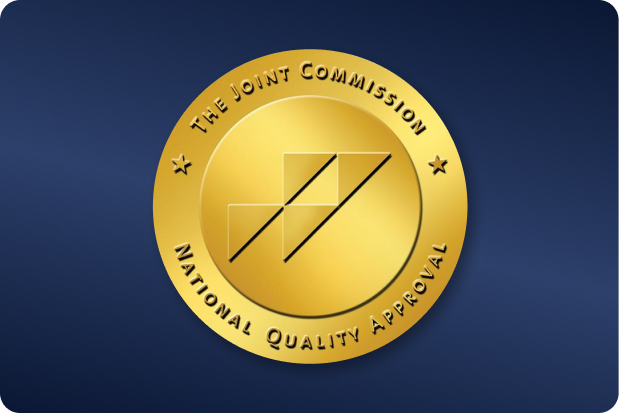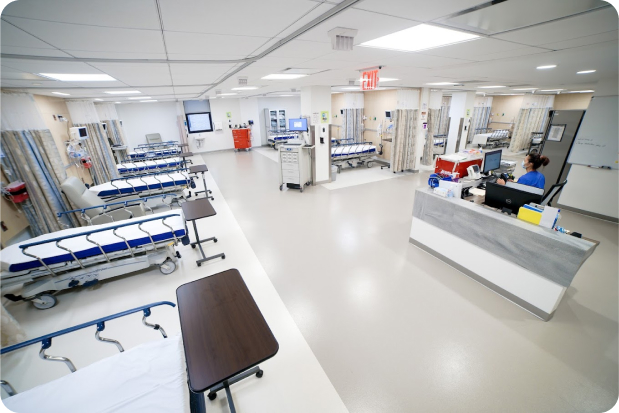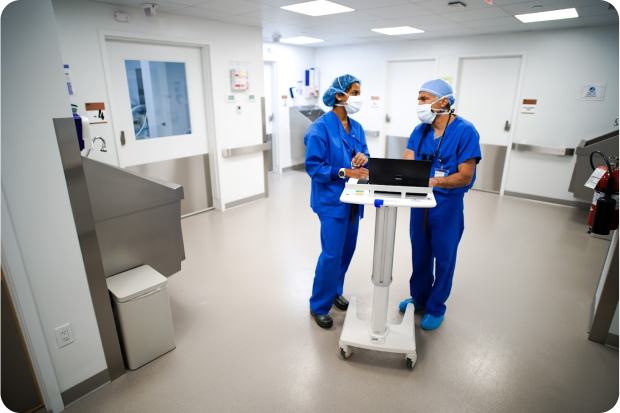 OUR LOCATIONS
Same-day Appointments Book OnlineCall to book 201.523.9590
OUR LOCATIONS
Same-day Appointments Book OnlineCall to book 201.523.9590
 OUR LOCATIONS
Same-day Appointments Book OnlineCall to book 201.523.9590
OUR LOCATIONS
Same-day Appointments Book OnlineCall to book 201.523.9590
Table of contents
The Spine & Rehab Group’s neurologists, rehabilitation physicians, and sports medicine doctors provide comprehensive, integrated care for patients suffering from cervical spinal stenosis and other spine conditions. Our spine specialist’s holistic multidisciplinary approach guarantees that every diagnostic angle is explored and that the cause of your symptoms is diagnosed and treated as soon as possible.
Spinal stenosis is a narrowing of one or more areas in your spine — most often in your neck or lower back. This narrowing can put pressure on the spinal cord or spinal nerves at the level of compression. There are different types of spinal stenosis. They are differentiated by where the condition has occurred. If the spinal stenosis occurs in the neck, it is known as cervical spinal stenosis. If spinal stenosis occurs in the lower back, then the condition is other known as lumbar spinal stenosis.
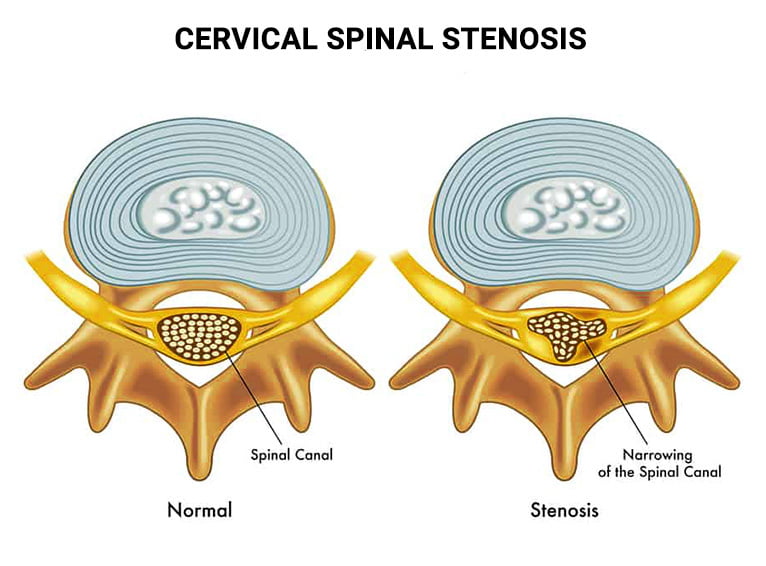
Some people are simply born with a narrowing within the spine. If the spinal canal is already small from birth, people are at an increased risk of having difficulties with their spine later on in life.
Some other causes of spinal stenosis include:
The most common risk factors for cervical spinal stenosis include:
Spinal stenosis doesn’t often lead to complications, but the physicians at our pain clinic strongly advise you to get a consultation if you experience any of the above-mentioned symptoms. This is important because, when left untreated, spinal stenosis can lead to incontinence, numbness, weakness, and even paralysis.
It's been years since I've had neck pain. Dr. Hosny diagnosed me with cervical stenosis after examining me at The Spine & Rehab Group. When I learned about the benefits of epidural steroid injections, I decided to give this type of treatment a try. I was relieved of my pain following the second treatment. Dr. Hosny is always attentive, caring, and patient with me.
Mark P. ★★★★★I've been a patient here at Spine & Rehab Group for 3 years now and have nothing but good things to say. An absolutely wonderful staff including my PA, Melanie Fillian who is extremely knowledgeable and caring and has great bedside manners. I have a total of 5 disc herniations, spinal stenosis and degenerative disc disease from years in construction and their aggressive regimen of procedures and the right meds have helped me tremendously.
I refer friends there as well with great results!
Easy to reach and make appointments, great understanding and caring staff and convenient location. I highly recommend this practice for anyone who suffers from chronic pain and or sports injuries.
Depending on which nerves are affected, spinal stenosis can result in:
Pain is not always present, particularly if you have spinal stenosis in your neck.
To diagnose spinal stenosis, pain management doctors at our clinic will ask you about the symptoms you’ve been experiencing and go through your medical history. You will also need to have a physical examination. Your doctor might also order you to get imaging tests to help identify the cause behind the symptoms.
The imaging tests that are used to diagnose such a condition include:
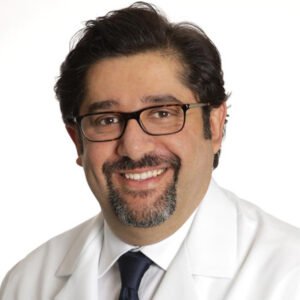 Amr Hosny, MD, MBA, FASA
Book Now
Amr Hosny, MD, MBA, FASA
Book Now
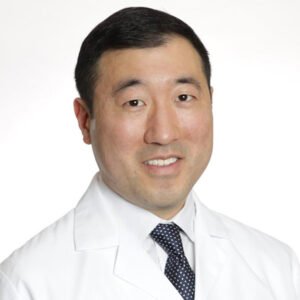 David Chu, MD, FAAPMR
Book Now
David Chu, MD, FAAPMR
Book Now
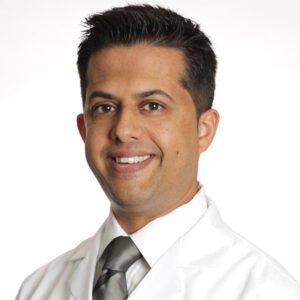 Vivek Mehta, MD, FAAPMR
Book Now
Vivek Mehta, MD, FAAPMR
Book Now
 Deepali Gupta, MD, DABA, DABPM
Book Now
Deepali Gupta, MD, DABA, DABPM
Book Now


When it comes to treating cervical spinal stenosis, it will all depend on how severe your symptoms are and where the stenosis is located. Before turning to surgery and stronger medications, our doctors will advise you to try conventional treatments, which come without side effects and can help with spinal stenosis pain.
Some conventional treatment options include:
If the symptoms are mild, the doctor might give you some tips to follow when at home and recommend further monitoring your condition.
If this doesn’t help and the symptoms are still present or get worse, you might get prescribed medications such as:
In cases where these medications aren’t helpful, your doctor might need to prescribe you opioids. Some opioids can only be used for a shorter period, while others can be considered for treating spinal stenosis for a longer period. However, in such cases, your doctor will need to monitor you strictly. Opioids have a risk of causing serious side effects, but they can also lead to addiction. Another treatment option that medical professionals consider for spinal stenosis patients is steroid injections.
Injections that can help with nerve roots, especially when they are swollen and irritated, include:
When all treatment options have been tried out and nothing helps, our doctors might recommend spinal stenosis surgery.
The Spine & Rehab Group offers a variety of non-invasive pain therapies to help alleviate the pain of cervical spinal stenosis. Contact our office for a spinal stenosis evaluation and treatment options. Our goal is to provide you with a treatment plan tailored to your diagnosis and intended to relieve pain while allowing you to remain active.
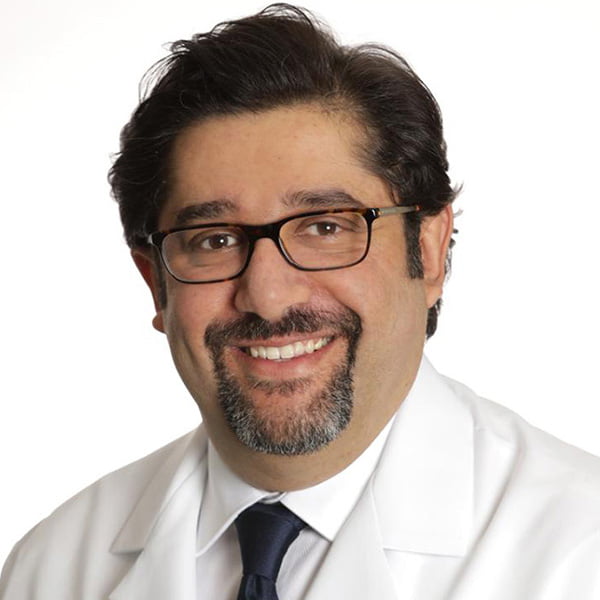
Dr. Hosny is a distinguished physician, educator, and healthcare leader with a commitment to advancing health equity and accessibility in the rapidly evolving landscape of modern healthcare. After completing his residency at St. Luke's Roosevelt Hospital Center, affiliated with Columbia University in New York City, he pursued an Interventional Spine Fellowship at Beth Israel Deaconess Medical Center, part of Harvard Medical School in Boston, MA.
Dr. Hosny has held prominent roles in academic medicine, including serving as an Associate Clinical Professor at New York Medical College and as the Interventional Spine Fellowship Program Director. These positions reflect his dedication to mentoring the next generation of healthcare professionals and advancing the field of interventional spine care.
More About Dr. HosnyThe Spine & Rehab Group
140 NJ-17,
Paramus, NJ 07652
(212) 242-8160
